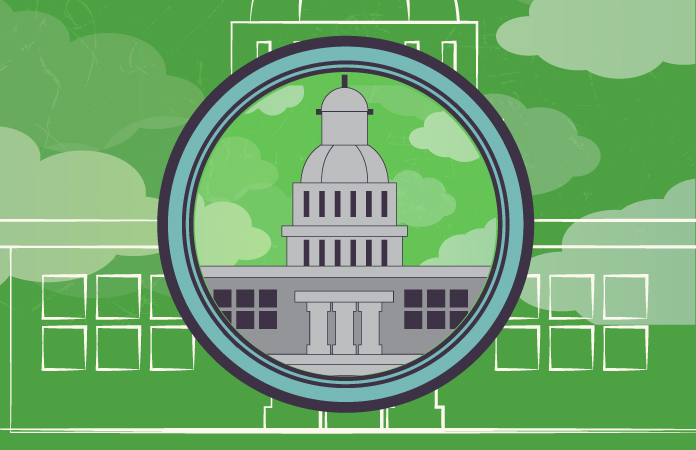

Lawmakers introduced a bill this week that would prohibit peace officers from using prone restraints, except in cases in which the use of deadly force is justified. The bill applies to peace officers and guards in detention facilities and requires officers who use prone restraints to immediately reposition a person to facilitate breathing once the person is in hand restraints.
Another bill was introduced that would allow some judicial contractors to be eligible for federal student loan forgiveness. Contractors who work with the Office of the Alternative Defense Counsel, the Office of the Child’s Representative and the Office of Respondent Parents’ Counsel would qualify for the loan forgiveness under the bill because providing the same services through state employees would create ethical conflicts.
Bill Number: HB24-1366
Title: Sustainable Local Government Community Planning
Introduced: March 11
Sponsors: M. Froelich, K. Brown
Summary: The bill requires state agencies to prioritize awarding grants that satisfy a list of criteria described in the bill. The bill requires, beginning Jan. 1, 2025, a county or municipality to include a climate action element in its updated master plan. A climate action element must include climate-related goals, plans or strategies and a description of any fund the local government has received for the implementation of any of the plans or goals described in the climate action element.
Bill Number: HB24-1370
Title: Reduce Cost of Use of Natural Gas
Introduced: March 11
Sponsors: C. Kipp, J. Willford
Summary: The bill requires the Colorado Energy Office to issue a request for information by Dec. 1 to solicit interest from local governments that are served by a dual-fuel utility in becoming a gas planning priority community. A gas planning priority community is defined in the bill as a local government in which constituents have gas service provided by a dual-fuel utility that formally indicates an interest in working with the utility to mutually explore opportunities for neighborhood-scale alternatives projects as defined in the bill.
Bill Number: HB24-1372
Title: Regulating Law Enforcement Use of Prone Restraint
Introduced: March 11
Sponsors: S. Woodrow, L. Herod, R. Fields, J. Gonzales
Summary: The bill prohibits peace officers from using prone restraint to subdue a subject, except in cases in which the use of deadly physical force is justified. The bill requires officers who use prone restraint to immediately reposition a person to facilitate breathing once the person is in handcuffs or the person’s hands are tied. The bill applies a similar prone restraint prohibition and recovery position requirement to guards and peace officers employed in detention facilities.
Bill Number: SB24-180
Title: Repeal Colorado Digital Token Act
Introduced: March 11
Sponsors: S. Fenberg, J. Smallwood, W. Lindstedt, T. Winter
Summary: The Colorado Digital Token Act provides limited exemptions from the securities registration and securities broker-dealer and salesperson licensing requirements for persons dealing in digital tokens. “Digital token” is defined in the act as a digital unit with specified characteristics that is secured through a decentralized ledger or database, exchangeable for goods or services and capable of being traded or transferred between persons without an intermediary or custodian of value. The bill repeals the act.
Bill Number: HB24-1373
Title: Alcohol Beverage Retail Licensees
Introduced: March 12
Sponsors: J. Amabile, N. Ricks, D. Roberts, P. Will
Summary: The bill eliminates the liquor-licensed drugstore license, effective Jan. 1, 2025. All active liquor-licensed drugstore licenses will convert to a fermented malt beverage and wine retailer license on that date; except a licensee with a single location may choose to convert the liquor-licensed drugstore license to a retail liquor store license. The bill also makes conforming amendments to account for the removal of the liquor-licensed drugstore license. The bill requires fermented malt beverage and wine retailers to display alcohol beverages for sale in a single location on the licensed premises, among other requirements.
Bill Number: HB24-1374
Title: Judicial Contractor Loan Forgiveness Eligibility
Introduced: March 12
Sponsors: J. Marvin, M. Rutinel, D. Michaelson Jenet
Summary: Independent contractors were previously ineligible for the federal public service loan forgiveness program, which forgives remaining federal student loan liability for government and nonprofit full-time employees after 10 years of qualifying service, but in 2023 the federal government made contractors who perform work for a government agency eligible for the program if the work can’t be performed by a government employee. Three independent judicial agencies, the Office of the Alternative Defense Counsel, the Office of the Child’s Representative and the Office of Respondent Parents’ Counsel primarily use contractors to provide legal representation on behalf of the agencies because providing the same services through state employees would create ethical conflicts. To enable these contractors to qualify for the program if they otherwise meet program requirements, the bill clarifies that state employees can’t provide the legal services the independent contractors provide, allows the agencies to certify that a contractor appears to be eligible for the program and because some contractors provide or have provided legal services on behalf of more than one of the agencies, authorizes the agencies to share contractor information to the extent necessary to certify a contractor’s eligibility for the program.

Law Week’s legislative tracking is done through State Bill, a product of our publisher, Circuit Media.

